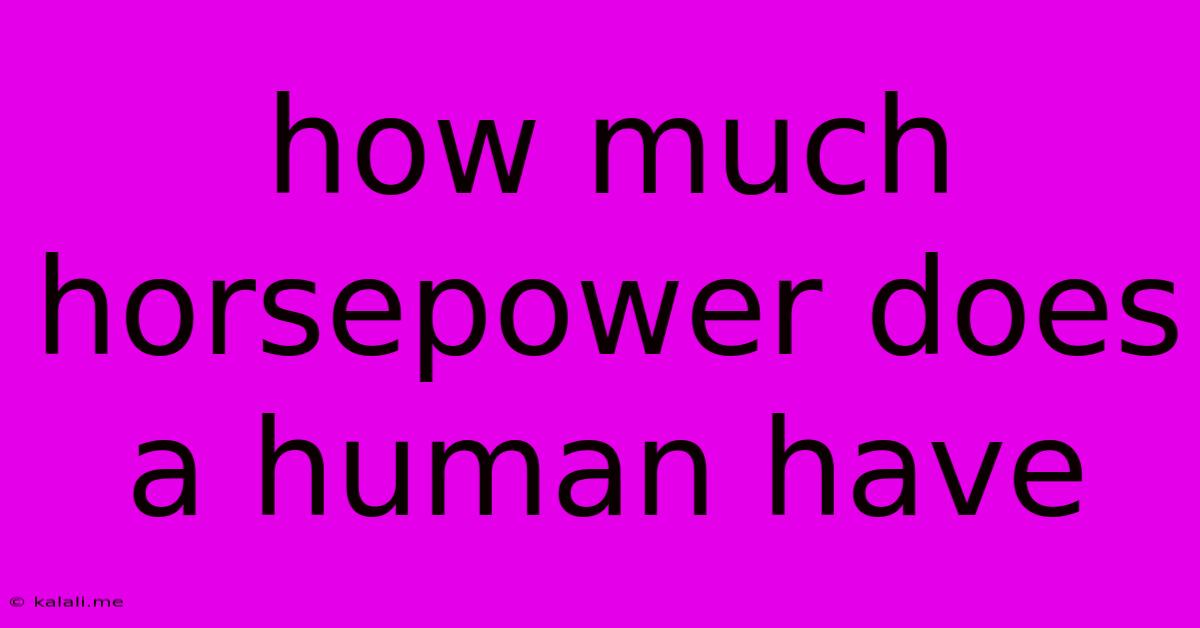How Much Horsepower Does A Human Have
Kalali
Jun 07, 2025 · 3 min read

Table of Contents
How Much Horsepower Does a Human Have? Unpacking the Myth of Human Horsepower
How much horsepower does a human have? It's a question that sparks curiosity, often leading to surprising answers. While the concept seems straightforward, understanding human horsepower requires delving into the complexities of measuring human power output and the historical context of the term itself. This article will explore the science behind human power, debunking common misconceptions and providing a clearer picture of our physical capabilities.
The Origins of Horsepower: A Historical Perspective
The term "horsepower" itself originates from the 18th century, when James Watt, a Scottish engineer, needed a way to quantify the power of his steam engines relative to the working capacity of horses. He estimated that a strong horse could lift 33,000 pounds one foot in one minute. This became the standard for one horsepower (hp). It's crucial to remember that this was an estimate, not a precise scientific measurement of equine power.
Measuring Human Power Output: Beyond the Horsepower Analogy
Applying the same standard directly to humans isn't straightforward. Humans don't consistently pull weights like draft horses; our power output depends heavily on the type of activity, duration, and individual fitness levels. Instead of horsepower, scientists often use watts (W) to measure human power. One horsepower is roughly equivalent to 746 watts.
Peak Human Power: Short Bursts of Intense Effort
In short, intense bursts of activity, like sprinting or cycling at maximum effort, a highly trained human athlete can generate a power output equivalent to approximately 1-2 horsepower for a very short period. This is a peak performance, unsustainable for more than a few seconds. Think of Olympic sprinters at the peak of their race.
Sustained Human Power: Endurance and Efficiency
For longer durations, our power output significantly decreases. Sustained activities, such as cycling or rowing for extended periods, typically result in a much lower average power output. A fit individual might sustain around 0.1 to 0.3 horsepower over several minutes or even an hour. This reflects the body's physiological limitations in energy production and heat dissipation. Endurance athletes excel at maximizing this sustained power output.
Factors Affecting Human Power Output:
Several factors influence the power a human can generate:
- Fitness level: Highly trained athletes consistently produce higher power outputs than untrained individuals.
- Type of activity: Activities that primarily involve muscle strength (weightlifting) will yield different results than those requiring endurance (long-distance running).
- Duration of activity: Sustained power output decreases over time due to fatigue and energy depletion.
- Individual variations: Genetic factors and body composition also play a significant role.
Conclusion: Understanding the Nuances
While the "horsepower" analogy is a simplified way to visualize human power, it's essential to understand its limitations. A human's power output is far more complex and context-dependent than a simple horsepower figure can capture. While peak power might reach 1-2 hp briefly, sustained power output is considerably lower. Focus on watts as a more accurate and scientifically sound unit for measuring human physical capabilities. The true measure of human strength and endurance lies not just in peak power but also in the ability to sustain effort over time.
Latest Posts
Latest Posts
-
Naked Women In Game Of Thrones
Jun 08, 2025
-
Many More Happy Returns Of The Day
Jun 08, 2025
-
Amp Hour Rating Of Car Battery
Jun 08, 2025
-
How To Take Off Tub Spout
Jun 08, 2025
-
Introduce Latent Variable For Dirichlet Distribution
Jun 08, 2025
Related Post
Thank you for visiting our website which covers about How Much Horsepower Does A Human Have . We hope the information provided has been useful to you. Feel free to contact us if you have any questions or need further assistance. See you next time and don't miss to bookmark.